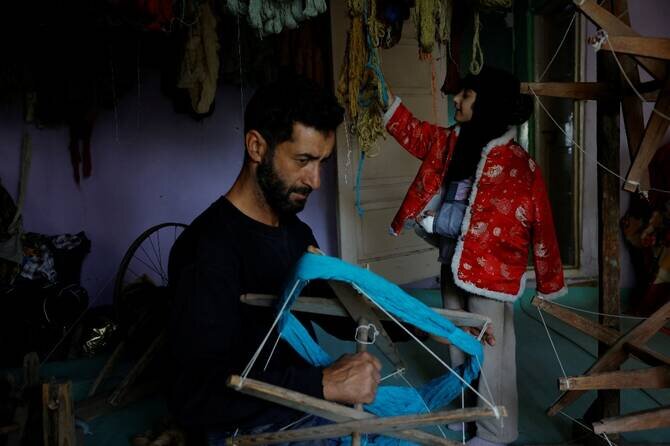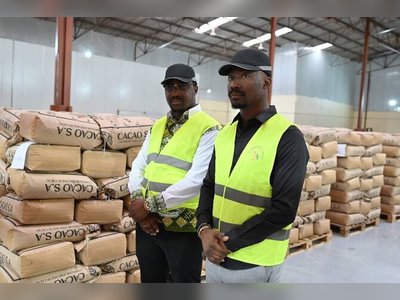
Hobbled by US Tariffs, Carpet Weavers in India's Kashmir Struggle to Stay Afloat
Increased US tariffs have forced many carpet weavers in India's Jammu and Kashmir region to abandon their craft, leading to a loss of traditional skills.
Gulzar Ahmad Bhat, a former carpet weaver from India’s Jammu and Kashmir region, has switched to selling tea by the shores of Dal Lake.
His decision comes after 35 years in the craft, which he found unviable due to increased US tariffs that have affected his ability to afford school fees and medicine for his family of six.
The imposition by US President Donald Trump in August of a 50 percent tariff on Indian goods has significantly impacted thousands of Indian artisans and weavers.
Bhat, aged 49, had to hire another weaver to complete his last carpet before laying down his tools.
He lamented, "This profession is dying," indicating the dire state of their industry.
The US market accounts for nearly 60 percent of India’s handmade carpets, according to industry estimates.
The Himalayan region of Kashmir, famous for its Persian-style tufted and knotted varieties, employs around 400,000 people in its handicraft sector, as reported by the Jammu and Kashmir Industry Chamber.
The export data from India's trade ministry shows a decline of more than 16 percent in September compared to the previous year.
This has led manufacturers to cut jobs and delay their expansion plans.
Mujtaba Qadri of M&K Exports, which specializes in shawls and rugs mainly for the US market, commented on the slow business due to increased tariffs.
He also noted that many workers are losing their jobs and shifting to other work, thereby risking a loss of traditional skills.
Efforts by New Delhi to assist affected exporters include financial incentives and exploring new markets.
However, local exporters caution that these measures might take time to yield results.
The peak export season from October to December is particularly challenging due to the tariffs, with winter orders getting stuck and causing unsold goods to pile up in warehouses.
Mohammed Yaqoob Bafanda, a third-generation carpet maker aged 40, believes that the tariffs are another blow to an already struggling industry.
His family business has seen a decline from 100 handlooms during his father’s time to around 20 today, accompanied by a drop in weavers from 300 to just four or five currently.
Bafanda fears that if the 50 percent tariff persists, the entire industry will collapse.
He further mentioned having 40 to 50 unsold carpets in stock with no buyers, highlighting the financial distress faced by manufacturers like himself.
His decision comes after 35 years in the craft, which he found unviable due to increased US tariffs that have affected his ability to afford school fees and medicine for his family of six.
The imposition by US President Donald Trump in August of a 50 percent tariff on Indian goods has significantly impacted thousands of Indian artisans and weavers.
Bhat, aged 49, had to hire another weaver to complete his last carpet before laying down his tools.
He lamented, "This profession is dying," indicating the dire state of their industry.
The US market accounts for nearly 60 percent of India’s handmade carpets, according to industry estimates.
The Himalayan region of Kashmir, famous for its Persian-style tufted and knotted varieties, employs around 400,000 people in its handicraft sector, as reported by the Jammu and Kashmir Industry Chamber.
The export data from India's trade ministry shows a decline of more than 16 percent in September compared to the previous year.
This has led manufacturers to cut jobs and delay their expansion plans.
Mujtaba Qadri of M&K Exports, which specializes in shawls and rugs mainly for the US market, commented on the slow business due to increased tariffs.
He also noted that many workers are losing their jobs and shifting to other work, thereby risking a loss of traditional skills.
Efforts by New Delhi to assist affected exporters include financial incentives and exploring new markets.
However, local exporters caution that these measures might take time to yield results.
The peak export season from October to December is particularly challenging due to the tariffs, with winter orders getting stuck and causing unsold goods to pile up in warehouses.
Mohammed Yaqoob Bafanda, a third-generation carpet maker aged 40, believes that the tariffs are another blow to an already struggling industry.
His family business has seen a decline from 100 handlooms during his father’s time to around 20 today, accompanied by a drop in weavers from 300 to just four or five currently.
Bafanda fears that if the 50 percent tariff persists, the entire industry will collapse.
He further mentioned having 40 to 50 unsold carpets in stock with no buyers, highlighting the financial distress faced by manufacturers like himself.










